Torn Preview
We speak with Dave Moldonado and Feargus Urquhart of Black Isle Studios to uncover new details on this upcoming RPG.
Black Isle Studios is the premier publisher of role-playing games, developing or publishing such games as Planescape: Torment, Icewind Dale, and Baldur's Gate. The first game that really launched the Black Isle brand, though, was Fallout, a postapocalyptic role-playing game that won universal acclaim and legions of fans. Now, Black Isle is poised to bring the Fallout style of gameplay to the more common fantasy RPG genre and create an RPG called Torn that will rival even Baldur's Gate in the arena of huge, epic role-playing experiences. It helps that Black Isle can draw on its experiences with a variety of hit RPGs. The team that created Planescape: Torment is designing Torn, and the artists from Torment and Icewind Dale are creating the look of this new gameworld. Add to that the same role-playing system that made Fallout such a hit, and you have as sure a formula for success as you can get in this industry.
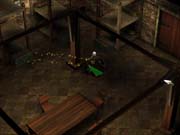
GameSpot recently visited the offices of Interplay and Black Isle Studios to get a closer look at Torn. Surprisingly, Black Isle has been working on Torn since production wrapped on Torment, which was over a year and a half ago. The game is scheduled to ship by the end of the year. However, several circumstances are forcing the game to take longer to build than Icewind Dale, which was finished in a year. For one, Torn features an entirely new gameworld, not drawn from D&D, which heretofore has been Black Isle's bread-and-butter setting. Thus, Black Isle's artists are having to create all-new creatures, worlds, and characters that are different enough from Dungeons & Dragons but still familiar enough to returning RPG gamers. Secondly, Black Isle is turning to Monolith's LithTech engine to power Torn. Original work began on Torn using the LithTech 1.5 engine, but since then, Monolith has delivered more-advanced builds over time to Interplay. That's forced Black Isle to tweak and redo levels and assets, resulting in scheduled but nonetheless frustrating delays to production. At this moment, Torn is on LithTech version 3.1. Yet, the visual improvements on previous Black Isle games is noticeable. While the levels aren't entirely populated yet, we did see a variety of spectacular special effects associated with spells. Dynamic shining pentagrams, brilliant explosions, fiery missiles, and more accompany many of the spells in the game, and they look better than the psionic special effects in Monolith's own Sanity action game of last year.
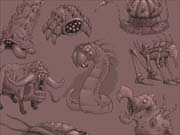
However, although the technology is continually evolving in Torn, and the levels are just now being really developed, much of the game design, story, and world is already months old, thanks to the active imagination and diligent creativity of the Torn design team. Let's take a closer look at the design of this upcoming RPG.
The World of Torn
The name Torn refers to the gameworld's ancient history, when the gods tore apart the world because they couldn't agree on how to populate it. Since then, various fantasy mainstays have populated the world and thrived in it, including such beings as ogres, elves, dwarves, halflings, humans, and dragons. Of the player character races, you can choose from humans, elves, dwarves, halflings, and sidhe, who are wood elves. Ogres were originally a playable race, but the designers soon found that they were having to redraw all the items and levels in the world to accommodate the much larger size of the ogre, so they dropped the ogre as a PC race. You'll still encounter them as NPCs and monsters, though.
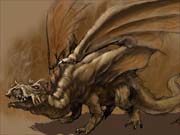
As evidenced by the races, many of the conventions of fantasy RPGs are being followed in Torn. However, the story itself is different, and the world has its own unique back story, creating a gameworld that is as rich and alive as any D&D world. In the game itself, your hero is called to action as the world is invaded by soldiers from another realm, who are unlike anything you've ever seen. They are beings twisted by a strange magic called biomancy. Dave Maldonado, lead designer of the game, says, "To summarize the basics [of the plot], the PC's journey takes him or her across the realms of Agathe to Orislane, where he or she is eventually swept into a spiral of increasingly epic events that ends with some serious, serious...well, I shouldn't really talk too much about it. Suffice it to say that it's got big armies, old friendships turned to bitter rivalries, romance, ancient prophecies, political intrigue, amazing swag to loot, mysteries to solve, philosophical wackiness, moral ambiguity, plot twists--the list goes on and on. We hope to entertain everyone immensely and in a way that they'll remember for a good, long time."
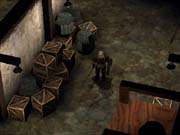
Although the events threatening the world are far-reaching and epic, you start the game under quite inauspicious circumstances. Black Isle wants to keep the beginning secret, but suffice it to say that you don't begin the game as ordinary heroes do. Look to Baldur's Gate II for an idea of how Torn will start. Regardless, you'll explore only a small part of the enormous world of Torn. Says Maldonado, "We've tried to create a vast, ancient world with Torn, though this first game takes place in a relatively small (and young!) chunk of it known as Orislane. This seaside kingdom contains enough settlements and monster-ridden wilderness to be at least as large (if not larger) than the settings of the Fallout games." Maldonado elaborates, "Despite the fairly 'tight' setting, we've aimed to include a wide variety of area types to explore--coastal trade towns, hidden mountain fortresses, the sprawling underground ruins of an abandoned dwarf city, labyrinthine woods corrupted by dark magic, troll villages, and much more."
Gameplay
Torn will be a significant departure for Baldur's Gate players, but it will be very familiar to Fallout players. That's because Torn uses the SPECIAL role-playing system from Fallout. In this system, the abilities are strength, perception, endurance, charisma, intelligence, agility, and luck. Also, while the game is level-based, it isn't class-based. You define your class by the skills and perks you pick. While the skills, such as thievery and stealth, are pretty straightforward, the perks are more or less special abilities. Taking a combination of sneaky skills and backstabbing perks basically turns you into a thief, while taking combat skills and attack perks makes you a fighter. You can read more about the SPECIAL system at the official Torn Web site. One new thing that affects your character is your race, which was never a question in Fallout. In Torn, being a certain race, such as dwarf or elf, opens unique skills and perks to you. It also affects how NPCs might react to you.
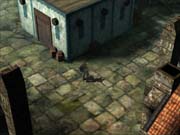
The SPECIAL system does not allow for multiple controllable player characters. In that respect, Torn will be different from Baldur's Gate. You don't control a party of six characters. Instead, you control only your main character, although up to five other NPCs can join your party and become your companions. They will then adventure with you and fight for you, but AI scripts control their behavior. You can only adjust their equipment and inventory. Even spell selection will be left to the AI. However, Black Isle has had two Fallout games to perfect this AI-controlled system, so Feargus Urquhart, the president of Black Isle Studios, is confident that the companions will play intelligently.
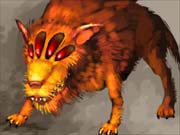
The biggest change from the usual SPECIAL system is that Torn will have real-time combat only. While Fallout's action point system will be retained, it will be disguised as a recovery system. Maldonado explains: "Torn uses what we call a recovery system, in which action points (or AP) are still used as a basis for how much a combatant can do in a given amount of time. In it, PCs must wait a certain amount of time between attacks based upon whatever percentage of their total action points their last attack cost. There are a number of exceptions, such as for moving (always allowed, but prevents further recovery until movement stops), using items, or switching equipment (may be done at any time but resets the recovery time). So for example, a character with six AP making three-AP attacks and a character with 10 AP making five-AP attacks would both attack at the same rate, as they're both expending 50 percent of their AP with each action. A good deal of our combat tweaking is taking place now [to make the AP system work well]--too fast and there's no time for strategy, too slow and gameplay is awkward and boring. We think we've got it just about right, now."
At this stage, Black Isle is putting together many of the levels and quests and finalizing monsters and characters. Thus, we couldn't see a complete build of the game. However, we were able to ask Dave Maldonado and Feargus Urquhart more questions. They talk about the quests you'll face in Torn, the type of gameplay enabled with the SPECIAL system, and the new skills and perks in the game. Read on for details.
Q&A with Dave Maldonado and Feargus Urquhart
GameSpot: What challenges and quests can we expect to face in Torn?
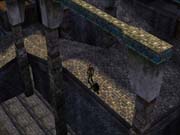
Black Isle Studios: All sorts, really--after all, such is really the meat of a CRPG like Torn. Depending upon what the player wants to get involved in, the PC could find him- or herself putting an end to the plotting of scheming, murderous political advisors; seeking acceptance as an acolyte of a religious order; loading and unloading crates for a day's pay; saving an entire city from the depredations of a power-mad demoness summoned by unwitting cultists; blackmailing a corrupt magistrate; breaking someone out of a duke's dungeons; stealing for fun and profit; "collecting" extortion money for the Thieves' Guild; saving the life of a dying child; playing rival bands of smugglers against one another; murdering for hire; tracking down vicious criminals for a bounty; and more--and that's just the very first area of the game! Things continue to get crazier and more extravagant as the game goes on, of course.[You'll be] seeking to build items of fantastic power, making obscene pacts with beings of utter unholy vileness, breaking into the stronghold of a powerful secret organization, and kidnapping someone right out from under their noses, and so on.
And, of course, there's the requisite "solve it in multiple ways!" bit--this is a big part of Torn and one of the traditions we're most happy to have carried over from the Fallout series. PCs will be able to handle virtually any situation through violence, guile, or diplomacy. They're free to play through the game any way that they want.
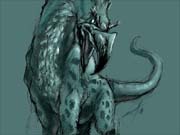
[Also], we aim to have more quests in which players set their own goals rather than running around for the benefit of others. The PC may have some overarching goal that he or she has been assigned to accomplish, but it's up to him or her to figure out exactly how to get it done. To use an example I've given previously, say the protagonist is on a quest to recover a forbidden book from a thief who had been paid to steal it but failed to deliver it. Entering the thief's lair, the protagonist finds that the thief has been murdered and the book stolen. The protagonist discovers that another group took the book from the thief and intends to trade it to a certain eccentric noblewoman in return for political favors. So does the protagonist return to his or her employer empty-handed, but with information on the book's current and future whereabouts? Steal the book from the group that murdered the thief? Wait for them to trade it away and then steal if from the eccentric noblewoman? It's for the player to decide.
GS: The SPECIAL system seems a natural for the postapocalyptic world of Fallout, but how does it fit for fantasy gaming?
BIS: Because of its flexibility, I'm quite confident that the skill-based SPECIAL system would work well for any setting. From fantasy to sci-fi, cowboys to cavemen, horror to giant robots, film noir to alternate reality WWII, just modify the skill set to best reflect the setting and wham--you're good to go.
Anyhow, for Torn, it was pretty much a matter of some non-setting-related tweaks (for example, additional balancing work, the turn-based to real-time changes, the special attack/defense/ability system, and so on); some new skills, perks, and traits; the additional races; and not much more. We probably did more adding to SPECIAL than removing or modifying.
SPECIAL Gameplay without the Numbers
GS: How will you alter the game to make it more accessible, as more gamers come into the genre due to games like Diablo but don't want to be bogged down in details?
BIS: In a nutshell, we've tried to add a great number of options and details that allow a player to determine exactly how his or her PC fights, but leave them "under the hood" where players who are less inclined to tinker with combat's fiddly bits won't have to worry about them.
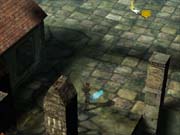
Part of this is creating a hit-based (as opposed to missed-based) combat system, where combatants will generally strike one another for relatively consistent amounts of damage (barring critical strikes). Of course, this means that the typical combatant will take at least several blows to lay out rather than one or two solid thwacks. This means that a player will be able to instantly see how his or her PC is performing in combat (how much damage the PC and companions are dishing out, how much damage they're taking, and so on) and modify his or her strategy accordingly.
Modifying strategy comes in the form of the special attack/defense/ability system. This allows the player to define exactly how his or her PC fights--do you try and reduce a target's mobility so that you can flee and pelt it with arrows? Reduce its offensive abilities so that it strikes you for less damage? Batter down its defenses so that you and your companions do more damage per blow? Blind it? Stun it? Knock it down? Steal its mana or hit points? Inspire your companions with flashy blows? This applies to defense, as well. When your character is struck, do you want to try and shrug off some of the damage? Convert some of the damage into MP? Counterattack instantly? Leap backward and try to hide in the shadows (like a ninja)?
The last part of the system, special abilities, works somewhat like spells. While not all SA are combat-related, many allow for permanent or temporary effects in battle--a berserk charge, a chance to get right back up and keep fighting when "killed," and so on.
Of course, a PC doesn't just start with all these combat abilities. They must be learned or earned. Much of the thinking and complexity comes into play here. Players interested in such can take the time to pore over their various options and when to use them. Do you choose a new special attack or upgrade an existing one? Which combat abilities would best compliment those of my companions, or my style of fighting and weapon? Am I better off trying to bust this hard-to-damage enemy's defenses down, or should I use a high-finesse attack that does even less damage but with an increased chance for a high-damage critical strike?
So to summarize the basic concept: If a player wants to simply progress through the game picking up combat abilities here and there, playing around with them in fights and so on, so be it. They'll get through the game and have a blast. But if a player wants to work at it, carefully control his or her PC's development get the most out of a mix of thoughtfully chosen combat abilities, developing tactics around them and those of his or her companions, that player will be greatly rewarded.
And, of course, when one throws magic into the strategy mix, things get even wackier.
New Skills and Perks
GS: What new skills are being introduced due to the fantasy setting?
BIS: There were two main forces driving the new skill set: play balance and the fantasy setting. The how's and why's of it all overlap occasionally, so I'll just simplify everything and belt out the new skill set:
The combat skills are melee (close combat skills), ranged (proficiency with thrown and projectile weapons), defense (defending oneself, avoiding blows), and fortitude (the ability to withstand damage). Note that despite the all-encompassing "melee" and "ranged" skills, PC's will be able to specialize in individual weapon types.
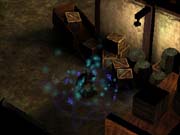
The magic skills are order (use magic to perfect reality, primarily defense- and improvement-based), chaos (use magic to warp or corrupt reality, primarily offense- and reduction-based), alchemy (use magic to alter physical reality, enchant, identify, and repair items), summoning (give shape to beings that normally have no physical form in reality), and mana focus (channel mana more effectively, meaning more spells cast before the PC must rest).
The rogue skills are stealth (sneakity-sneak!), locks and traps (for liberating poor, defenseless swag from the clutches of the undeserving--also used to set traps), and thievery (pilfering from creatures and stores alike).
The support skills are artisan (make stuff, fix stuff), barter (buy goods and services cheap--very handy for extra-expensive stuff like raising dead high-level companions or commissioning the creation of ludicrously powerful magic items), healing (good old-fashioned wound binding and such), lore (learn about items--how to use them better--and creatures--how to fight them better), outdoorsman (travel quickly, avoid ambushes, set ambushes, hunt for food in the wild, and so on), and speech (convince others that you're right, get better performance from companions, and so on).
GS: What new fantasy-based perks are being created?
BIS: The list is in a state of flux, so I can't really go into specifics at the moment.
We do intend to have a good number of event-related perks that a PC earns via completing certain tasks (for example, the PC is taught how to play musical instruments, gaining the musician perk), getting skills to a certain level (for example, raising one's melee skill to certain points affords a PC additional attack options in the form of new perks), and so on.
We've also got new perks to represent various specializations, either with weapons (for example, a sword master would have a melee bonus when using a sword), realms of magic (for example, a thaumaturge's order spells are more effective), magical elements (for example, a chronomancer's time-based spells are more effective), schools of alchemy, and so on.
Lastly, there are some race-specific perks that represent abilities that only one race might be able to acquire. For instance, elves might learn the ability to turn physical trauma (that is, damage) into magic (that is, mana points), while halflings might learn to play dead, forcing foolish attackers to choose another target.
GS: Thanks, Dave and Feargus.
Got a news tip or want to contact us directly? Email news@gamespot.com
Join the conversation